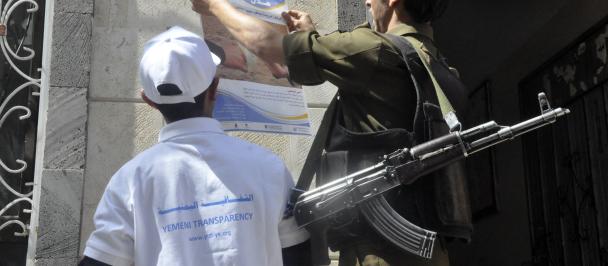Curbing corruption can contribute to preventing violent extremism. Research is gradually emerging on the linkages between corruption and violent extremism but remains a work in progress. At this stage, reasonable argument could be made that corruption is both a cause and consequence of governance deficits, and may create or sustain conditions that could fuel violent extremism.
Evidence from Transparency International suggests that the lowest-scoring countries on the Corruption Perceptions Index (CPI) are often those experiencing conflict or war. Reducing corruption could therefore increase the prospects for preventing violent extremism.
There is growing policy recognition that corruption is part of a multi-faceted set of drivers of violent extremism. The UN Secretary General's Plan of Action on Preventing Violent Extremism suggests that countries that fail to control corruption (amongst other indicators like poverty, unemployment, diversity management in accordance with human rights obligations), tend to witness greater number of incidents linked to violent extremism. A central question remains how to delineate the relationship between corruption and broader forms of security and development.
The six lowest-scoring countries on the CPI data, namely Somalia, South Sudan, Syria, Afghanistan, Yemen and Libya, are all facing intense conflicts including those characterized by violent extremism and terrorism. Afghanistan and Syria are also ranked amongst the countries that experienced the highest impact from terrorism according to the 2017 Global Terrorism Index (GTI). Other countries identified by the GTI, Pakistan, Nigeria and Iraq, scored low on the CPI. This does not suggest a causal relationship between corruption and violent extremism and terrorism or vice versa, and there are limitations regarding the global composite and perceptions indices. However, the relationship between corruption and violent extremism could be explained based on two broad observations:
First, state institutions such as the justice, security and socio-economic sectors are at much greater risk of being exploited as part of a corrupt network. When this occurs, it constrains the ability of these institutions to prevent or combat violent extremism. Corrupt practices often have the worst impact on the poor and most vulnerable groups in society especially young people, women, children, indigenous peoples and people with disabilities. Accordingly, sentiments of injustice, inequity and a perpetual feeling of helplessness across social groups could provide an enabling environment for violent extremism.
Second, regional and international corrupt practices amongst political leaders and officials may be used as a legitimizing tool by violent extremist organisations to validate their ideology and facilitate the recruitment of vulnerable groups. For example, the scope of corruption revealed by the Panama papers fed into the narrative often used by ISIS, Al Qaeda, Boko Haram and other terrorist groups about the patrimonial interests of political elites.
States have the primary responsibility of reducing corruption as an essential part of a comprehensive approach to tackling violent extremism. Promoting effective leadership and a change of mindset amongst political elites is crucial. Governments should do more to establish an impartial judiciary, legislature and anti-corruption agencies. An independent media and vibrant civil society will also facilitate an environment conducive to the fight against corruption.
Support to states by international and regional organizations as well as civil society will further enhance global norms aimed at reducing corruption. In this respect, the UN Sustainable Development Goals agenda is an important framework for supporting states to usher greater transparency and integrity in governance. In 2016, UNDP commenced support to states in the development and implementation of National Action Plans (NAPs) on PVE through research, policy support and programmatic interventions. Anti-corruption and PVE is an important theme that is captured in UNDP’s corporate framework Preventing violent extremism through promoting inclusive development, tolerance and respect for diversity: a development response to addressing radicalisation and violent extremism.
Other relevant stakeholders, including regional organizations such as the African Union, have commenced political discussions on anti-corruption. For example, the 2018 AU theme is Winning the Fight against Corruption: A Sustainable Path to Africa’s Transformation. There seems to be a growing global policy consensus on the benefits of addressing corruption as a pathway to sustainable peace. This is an encouraging sign!
Fighting corruption alone without addressing other structural vulnerabilities will not prevent or address violent extremism. Reducing corruption however represents a significant push and remains pertinent in seeking a comprehensive and ‘whole-of-society’ approach in preventing and responding to violent extremism.

 Locations
Locations




